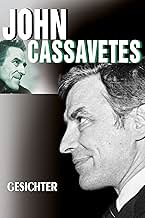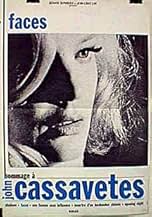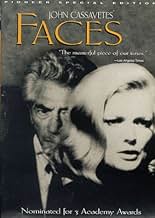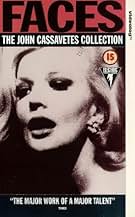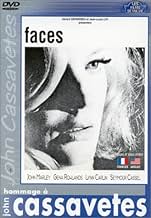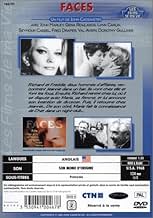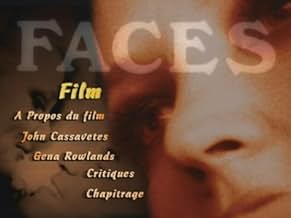IMDb रेटिंग
7.4/10
12 हज़ार
आपकी रेटिंग
अपनी भाषा में प्लॉट जोड़ेंA middle-aged man leaves his wife for another woman. Shortly after, his ex-wife also begins a relationship with a younger partner. The film follows their struggles to find love amongst each ... सभी पढ़ेंA middle-aged man leaves his wife for another woman. Shortly after, his ex-wife also begins a relationship with a younger partner. The film follows their struggles to find love amongst each other.A middle-aged man leaves his wife for another woman. Shortly after, his ex-wife also begins a relationship with a younger partner. The film follows their struggles to find love amongst each other.
- 3 ऑस्कर के लिए नामांकित
- 5 जीत और कुल 9 नामांकन
George Dunn
- Comedian
- (as George Dunne)
फ़ीचर्ड समीक्षाएं
I have only recently become acquainted with Cassavetes films and I am continually impressed. This film was made on a shoestring budget filming primarily at night because the actors had day jobs. The working title, I understand, was "Dinosaurs" which sums up things up nicely. This is an important film since it shows flawed human beings especially in a time that was truly in upheaval - the late `60's. But Cassavetes was already anticipating the attempt at overthrowing the status-quo. This is a hard but fascinating film to watch. The masks, the self-loathing, the fear, the confusion of intimacy, the now tired slogan of the war between the sexes with entertainment all driven by prescription pills, alcohol and cigarettes...it's all here. Is it "real" or is it "contrived"? Even a well acted scripted play still can penetrate us. The people and conversation "inane"? You bet. Go to work or a club and listen closely -- we live lives that should never be filmed. Cassavetes films as if he's eavesdropping. Lastly - I could not imagine this film or 'Shadows' in anything but b/w....even if he COULD have afforded color stock. Excellent film.
An old married man leaves his wife for a younger woman. Shortly after, his ex-wife also begins a relationship with a younger partner. The film follows their struggles to find love amongst each other.
This was one of the most influential films of the 1960s, if you consider how it inspired Robert Altman and Woody Allen, as well as employing Steven Spielberg as a production assistant while he was still making short films and had not yet broken into feature films.
How well the film has aged is debatable. While its influence is clear, the film itself is not necessarily the most fun. Some have called it "meandering", and it is hard to believe that at one point Cassavetes had a six-hour cut (allegedly).
This was one of the most influential films of the 1960s, if you consider how it inspired Robert Altman and Woody Allen, as well as employing Steven Spielberg as a production assistant while he was still making short films and had not yet broken into feature films.
How well the film has aged is debatable. While its influence is clear, the film itself is not necessarily the most fun. Some have called it "meandering", and it is hard to believe that at one point Cassavetes had a six-hour cut (allegedly).
10Dr.Mike
Faces is one of the first American films to reach to the >core of people's relationships. It provides wonderful insight into a lifestyle that is distinctly American. The detached way that the characters interact most of the time is only a logical conclusion of the commerce-driven world we live in. The film is personal in a way that many European films of the 1950's and 1960's were. Even the title suggests the intimacy of the film and its treatment of its characters.
Cassavettes must have been repulsed by the insincerity of the people who were surrounding him when he wrote Faces. Few films have so many moments where characters are together but not talking to each other. They are merely talking, or laughing, or singing, doing anything they can to avoid having to confront the other person. Only once, when the young lover boy talks about the mechanical nature of people in America, do we even get any hint that the filmmaker is put off by the behavior of his characters. The rest of the time he merely films them and shows us what they do. This unsentimental approach can leave the viewer feeling a bit odd, but it works very well in the end. By seeing these character's shortcomings without any hint of disapproval from the filmmaker, the viewer is forced to consider their own lives and the people around them. It allows for an honesty not found in any, I repeat ANY other American film of the 1960's. Even Who's Afraid of Virginia Woolf has some indications of Nichols' attitude towards the material. Faces is just the facts.
I can only imagine the excitement that people interested in film must have felt upon the release of this film. Here was a personal, Bergman-esque film made about American people living American lives. (Note: Bergman is referenced during the film.) The quiet desperation of the housewife, the empty feeling inside the businessman, the false nature of each and every relationship speak volumes about the reality of American family life. How refreshing it must have been to see these topics approached in an American film.
The film's style is notable as well. It is independent in every sense of the word. It uses a fluid camera, freeform acting, and natural lighting. In many ways, it paved the way for a lot of the young filmmakers of the 1970's by providing them with a stylistic freedom that Hollywood had previously ignored. Today, it appears as a fairly standard film in terms of style, but at the time it was groundbreaking and exciting. In fact, it retains that excitement today, although the real revelation is how much has been taken from the film and used by others.
Faces is a great movie experience. Anyone frustrated with the lack of real connection in their lives should see it, if only to realize that many others are suffering from the same fate.
Cassavettes must have been repulsed by the insincerity of the people who were surrounding him when he wrote Faces. Few films have so many moments where characters are together but not talking to each other. They are merely talking, or laughing, or singing, doing anything they can to avoid having to confront the other person. Only once, when the young lover boy talks about the mechanical nature of people in America, do we even get any hint that the filmmaker is put off by the behavior of his characters. The rest of the time he merely films them and shows us what they do. This unsentimental approach can leave the viewer feeling a bit odd, but it works very well in the end. By seeing these character's shortcomings without any hint of disapproval from the filmmaker, the viewer is forced to consider their own lives and the people around them. It allows for an honesty not found in any, I repeat ANY other American film of the 1960's. Even Who's Afraid of Virginia Woolf has some indications of Nichols' attitude towards the material. Faces is just the facts.
I can only imagine the excitement that people interested in film must have felt upon the release of this film. Here was a personal, Bergman-esque film made about American people living American lives. (Note: Bergman is referenced during the film.) The quiet desperation of the housewife, the empty feeling inside the businessman, the false nature of each and every relationship speak volumes about the reality of American family life. How refreshing it must have been to see these topics approached in an American film.
The film's style is notable as well. It is independent in every sense of the word. It uses a fluid camera, freeform acting, and natural lighting. In many ways, it paved the way for a lot of the young filmmakers of the 1970's by providing them with a stylistic freedom that Hollywood had previously ignored. Today, it appears as a fairly standard film in terms of style, but at the time it was groundbreaking and exciting. In fact, it retains that excitement today, although the real revelation is how much has been taken from the film and used by others.
Faces is a great movie experience. Anyone frustrated with the lack of real connection in their lives should see it, if only to realize that many others are suffering from the same fate.
10djb8
This movie is the epitome of brilliantly dramatic character study: It's so phenomenal, watching it is excruciating. Cassavetes takes us deep inside the lives of a bored, shallow upper-middle-class couple, and as his skilled actors improvise remarkably realistic scenes, down to the smallest mannerism of their characters, Cassavetes forces us to watch every knife-twisting second. It's difficult: Rather than watching an unpleasant situation, then getting pulled away by an editor's cut, we have to sit through all 20 or 25 minutes of a scene that makes us squirm, whether it's a middle-aged man making an ass of himself to impress a young prostitute or his wife feigning laughter to make a young man think she's having fun with him. While not the best movie I've ever seen, it's unique: A great work to whose style nothing else compares.
This is obviously not your average, everyday movie. It's some thing you could only watch at an art-house theater, so clearly this movie is not for just everyone.
John Cassavetes was a sort of guerrilla film-maker. His movies never felt like it had any storyboards or were rehearsed in any way. There was never a pre-setup plan, concerning any of its camera-work or positions and the actors all also seemed to be ad-libbing at points. They were just simply shooting away, which gives the movie a very raw and authentic feeling. I think this is the foremost reason why people really like his movies. I myself can appreciate it but that doesn't mean I'm that fond or impressed with it as well.
No, it's not really an easy or pleasant movie to watch. It's because the story is not really following a clear main plot line and things just seem to happen very randomly. I just simply prefer a more clear and straightforward story, since it also seemed to me that because of Cassavetes' approach, some of the sequences seemed to go on for ever and often weren't making that much sense for the story either.
I can still understand the story and what Cassavetes was trying to do and tell with it. It's basically a look into married life and not about any of its peachy or happy aspects. But however, like I mentioned before, I would had been more taken by it and probably would had find the story to be a more interesting one, if it had a more straightforward story and approach to it.
But yet I never hated watching this movie either. I can still definitely appreciate the way it got made and also all of the actors were a joy to watch. The movie really has some fine actors in it and I was especially fond of John Marley's performance. It were however Lynn Carlin and Seymour Cassel who received an Oscar nomination for their roles in this move.
Actually it seems quite amazing to me how this movie managed to score 3 Oscar nominations, since it's such an artistic movie, that normally would hardly get ever noticed or recognized by any of the big award shows. It perhaps says something about the popularity or status of director and writer John Cassavetes at the time or how people looked at movies.
For most people this movie will probably be too tough to bite through, or it simply won't be interesting enough to sit through but there is still a large crowd for these sort of movies out there. So if it sounds like it's your thing, chances are you'll probably end up loving it.
7/10
http://bobafett1138.blogspot.com/
John Cassavetes was a sort of guerrilla film-maker. His movies never felt like it had any storyboards or were rehearsed in any way. There was never a pre-setup plan, concerning any of its camera-work or positions and the actors all also seemed to be ad-libbing at points. They were just simply shooting away, which gives the movie a very raw and authentic feeling. I think this is the foremost reason why people really like his movies. I myself can appreciate it but that doesn't mean I'm that fond or impressed with it as well.
No, it's not really an easy or pleasant movie to watch. It's because the story is not really following a clear main plot line and things just seem to happen very randomly. I just simply prefer a more clear and straightforward story, since it also seemed to me that because of Cassavetes' approach, some of the sequences seemed to go on for ever and often weren't making that much sense for the story either.
I can still understand the story and what Cassavetes was trying to do and tell with it. It's basically a look into married life and not about any of its peachy or happy aspects. But however, like I mentioned before, I would had been more taken by it and probably would had find the story to be a more interesting one, if it had a more straightforward story and approach to it.
But yet I never hated watching this movie either. I can still definitely appreciate the way it got made and also all of the actors were a joy to watch. The movie really has some fine actors in it and I was especially fond of John Marley's performance. It were however Lynn Carlin and Seymour Cassel who received an Oscar nomination for their roles in this move.
Actually it seems quite amazing to me how this movie managed to score 3 Oscar nominations, since it's such an artistic movie, that normally would hardly get ever noticed or recognized by any of the big award shows. It perhaps says something about the popularity or status of director and writer John Cassavetes at the time or how people looked at movies.
For most people this movie will probably be too tough to bite through, or it simply won't be interesting enough to sit through but there is still a large crowd for these sort of movies out there. So if it sounds like it's your thing, chances are you'll probably end up loving it.
7/10
http://bobafett1138.blogspot.com/
क्या आपको पता है
- ट्रिवियाWhile filming a part on Bob Hope Presents the Chrysler Theatre (1963), John Cassavetes saw Steven Spielberg lurking around the set, as he was then in the habit of doing. Cassavetes approached Spielberg and asked what he wanted to be. When Spielberg replied he wanted to be a director, Cassavetes allowed the young man to direct him for the day. He later invited Spielberg to work on this film with Spielberg serving as an uncredited production assistant on Faces (1968) for two weeks.
- भाव
Maria Forst: There's a Bergman film in the neighborhood.
Richard Forst: I don't feel like getting depressed tonight.
- कनेक्शनFeatured in Cinéastes de notre temps: John Cassavetes (1969)
- साउंडट्रैकLove Is All You Really Want
Written by Jack Ackerman
टॉप पसंद
रेटिंग देने के लिए साइन-इन करें और वैयक्तिकृत सुझावों के लिए वॉचलिस्ट करें
- How long is Faces?Alexa द्वारा संचालित
विवरण
बॉक्स ऑफ़िस
- बजट
- $2,75,000(अनुमानित)
- दुनिया भर में सकल
- $7,236
- चलने की अवधि
- 2 घं 10 मि(130 min)
- रंग
- ध्वनि मिश्रण
- पक्ष अनुपात
- 1.66 : 1
इस पेज में योगदान दें
किसी बदलाव का सुझाव दें या अनुपलब्ध कॉन्टेंट जोड़ें


